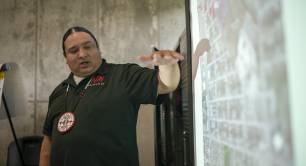Data-driven, deal-ready: partners aim high with impact management programme for 300 social ventures
Data-savvy entrepreneurs connect better with their customers and run healthier businesses. But social startups often lack technical knowhow. The Miller Center for Social Entrepreneurship wants to change that – and, thanks to a partnership with Sopact, it’s hoping to position itself as the top spot for social enterprises looking to power up their impact management. But there’s a learning curve for the accelerator, too.
The Miller Center for Social Entrepreneurship is a relative oldie among business-for-good accelerators. Created in 2003 as part of Santa Clara University in California, the center has become a well-established name worldwide, having helped some 1,300 social entrepreneurs to date.
But even this seasoned accelerator is still figuring out how to measure its own impact.
Those high-level indicators are useful, says programme manager for efficiency and learning, Isabel Miranda, “but they don't get into the nuances of impact, or… the additionality that we had as an accelerator”. In other words, it’s not clear how much impact enterprises would have made anyway even without Miller Center’s support – and therefore how much additional impact can actually be attributed to its work.
A ‘thought partner’
 Miranda (pictured) and her colleagues,
Miranda (pictured) and her colleagues,
The collaboration with Sopact – which is also based in California, with staff around the world – has a dual purpose: to help get a better picture of Miller Center’s own impact, and to help the ventures it supports, filling what Miranda describes as a gap in their curriculum.
“About a year ago, we really saw the need to support entrepreneurs on their impact model,” she says. Helping them develop a robust impact measurement and management (IMM) strategy would better position them to “appeal to investors and really grow their funding”.
They don't get into the nuances of impact, or… the additionality that we had as an accelerator
So began Miller Center’s search for an impact management specialist. It would need to bring technology expertise, but also be a “thought partner” to help them figure out the knotty, big-picture questions, such as understanding Miller Center’s indirect impact on the ecosystem. Plenty of tech-based platforms help you to gather data, Miranda says, but they’re generally “agnostic” when it comes to recommending which impact management frameworks to use, or in guiding users on a theory of change, for example. Sopact, though not the cheapest on the market, ticked those additional boxes (and won extra points as a social enterprise itself).
Experiments
Many social entrepreneurs view impact management as an arduous, convoluted and expensive task. But it’s a task that Miller Center is keen to “demystify”, Miranda says: yes, large-scale evaluations cost time and money, but social startups shouldn’t have to bear that cost, she believes, and in any case, they’re not always necessary.
“We're trying to teach entrepreneurs to focus on one or two outcomes and do these ‘impact experiments’: go collect data, and then make it an iterative process and build as you go. Over time, you're going to have a wealth of data from your stakeholders.”
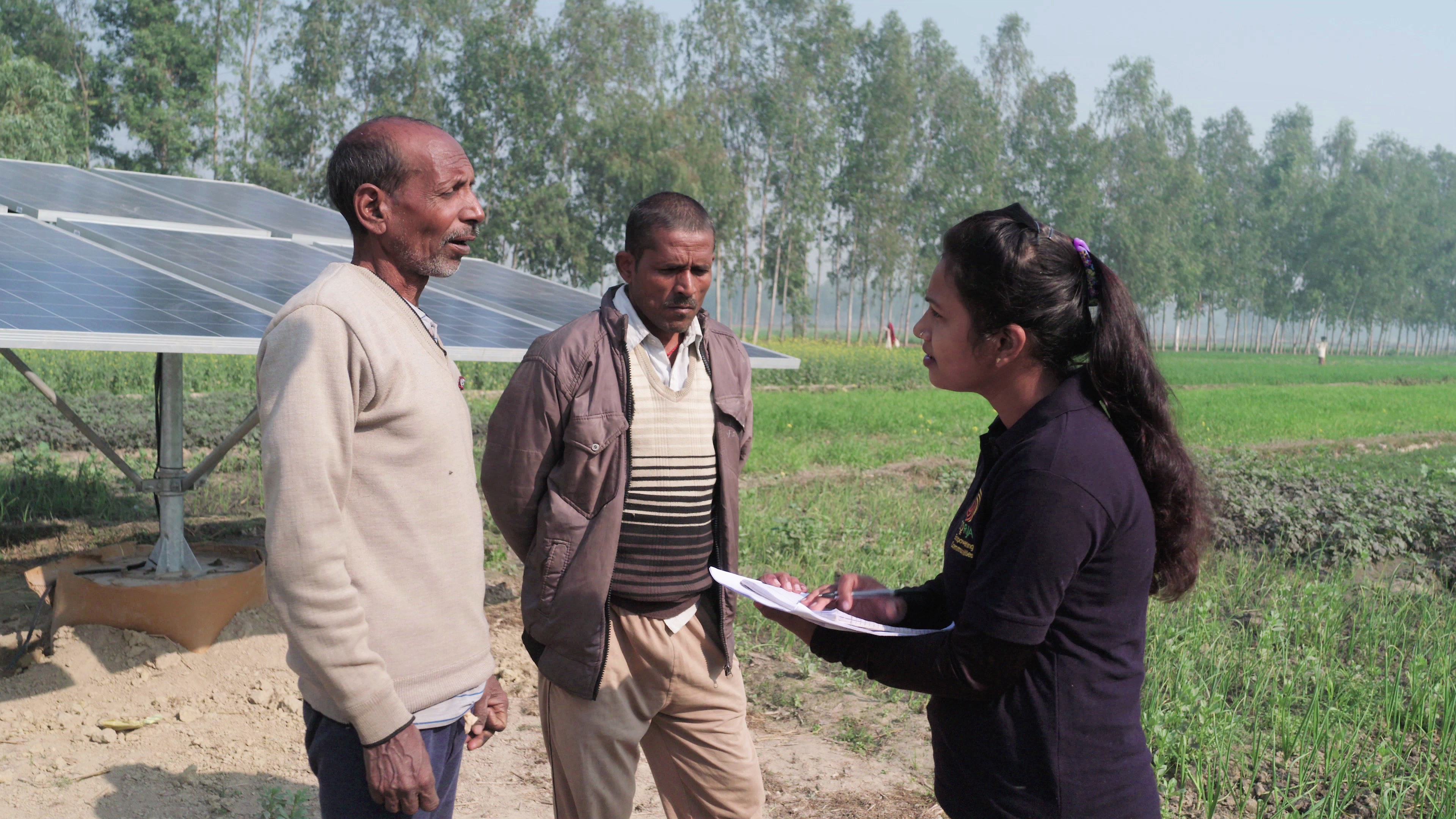
Above: Shraddha Gupta, project assistant at Oorja, conducting a farmer survey (image courtesy Oorja)
The ‘impact experiment’ is a concept developed by Sopact that draws on the Silicon Valley ethos of being lean and agile. (Sopact co-founder Unmesh Sheth comes from an earlier career in software engineering.) Rather than developing complex models that analyse multiple outcomes, impact experiments involve choosing just one to three priority outcomes a venture wants to achieve, then seeking feedback directly from stakeholders on this. That feedback is gathered frequently, and is aligned to the five dimensions set out by the Impact Management Project(what, who, how much, contribution and risk).
Go collect data, and then make it an iterative process and build as you go. Over time, you're going to have a wealth of data from your stakeholders
For example, Smart Havens Africa, a social enterprise focusing on affordable homes in Uganda, previously had a long list of intended outcomes. Now, it looks for just three that are of most interest to its beneficiaries: improved standards of living; increased stability and safety; and healthy financial habits that allow them to continue owning a home. Oorja, which provides irrigation, milling and cooling services to smallholder farmers in India, asks them about their income and profits. And US-based Well Beyond Water, which helps rural communities
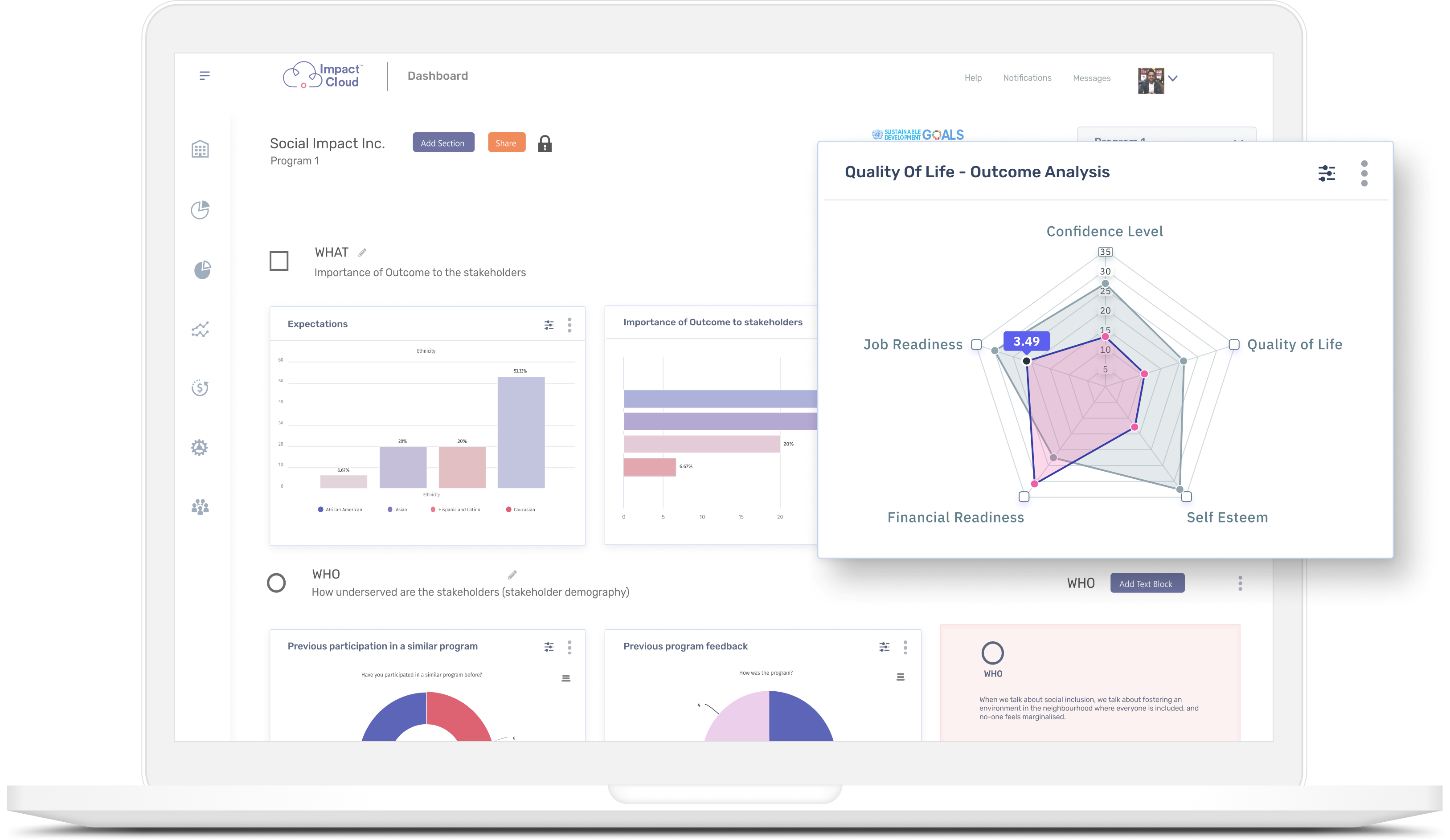 These three organisations first adopted this agile approach as part of a Miller Center programme focused on impact measurement and management. First piloted in 2021, a third cohort is now under way; ultimately, the partners hope to support more than 300 enterprises over five years.
These three organisations first adopted this agile approach as part of a Miller Center programme focused on impact measurement and management. First piloted in 2021, a third cohort is now under way; ultimately, the partners hope to support more than 300 enterprises over five years.
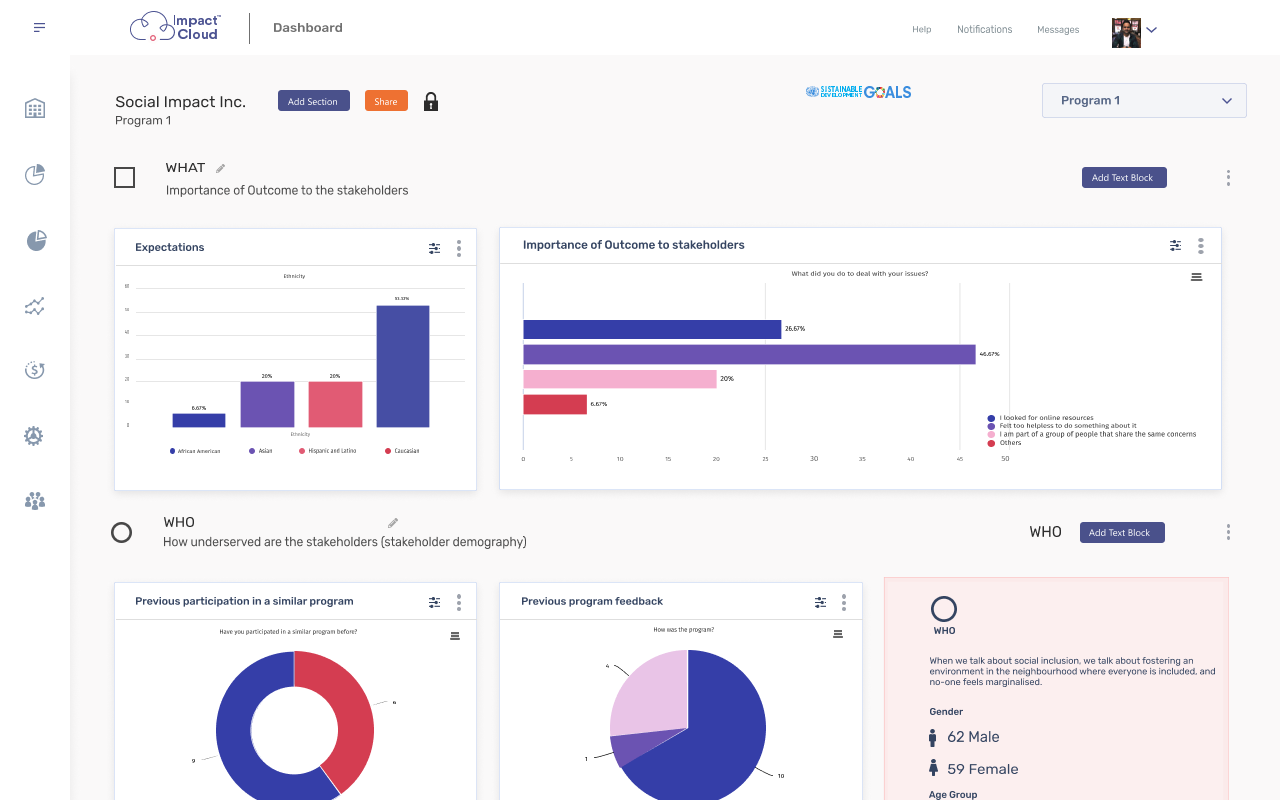 Over a 12-week programme, participants define main outcomes, design questions for stakeholders, collect baseline data, and put together impact dashboards (pictured) that automatically pull data from programs such as Google Sheets, Salesforce, or SurveyMonkey. They get advice on which framework to use (the technology allows you to select 4,000 impact management indicators aligned with various standards like IRIS+ or the Sustainable Development Goals). Mentors from the two programme partners provide assistance, and participants get a free, three-year licence for Sopact’s Impact Cloud, the cloud-based platform that hosts the dashboards. Miranda says she does not know of any other accelerator that subsidises IMM technology as part of the programme; in an increasingly competitive landscape, that makes this offer a “huge differentiator” for Miller Center.
Over a 12-week programme, participants define main outcomes, design questions for stakeholders, collect baseline data, and put together impact dashboards (pictured) that automatically pull data from programs such as Google Sheets, Salesforce, or SurveyMonkey. They get advice on which framework to use (the technology allows you to select 4,000 impact management indicators aligned with various standards like IRIS+ or the Sustainable Development Goals). Mentors from the two programme partners provide assistance, and participants get a free, three-year licence for Sopact’s Impact Cloud, the cloud-based platform that hosts the dashboards. Miranda says she does not know of any other accelerator that subsidises IMM technology as part of the programme; in an increasingly competitive landscape, that makes this offer a “huge differentiator” for Miller Center.
The Sopact approach won’t work for every enterprise. Even with the support of two partner organisations, ventures still need to collect the data themselves, and therefore need the capacity to do so.
 And even the “best platform in the world” won’t work when users aren’t tech savvy, Unmesh Sheth says. Indeed, entrepreneurs in the pilot programme faced quite a learning curve when it came to the technology, according to Miranda. So the plan now is to involve university students with experience of coding or data visualisation to help build the dashboards – leaving the entrepreneurs to focus more on the content: developing the theory of change, designing surveys and engaging with stakeholders. Sopact is helping to train those students
And even the “best platform in the world” won’t work when users aren’t tech savvy, Unmesh Sheth says. Indeed, entrepreneurs in the pilot programme faced quite a learning curve when it came to the technology, according to Miranda. So the plan now is to involve university students with experience of coding or data visualisation to help build the dashboards – leaving the entrepreneurs to focus more on the content: developing the theory of change, designing surveys and engaging with stakeholders. Sopact is helping to train those students
“We really work hand in hand with [Sopact]... that's helping us to build our own capacity,” says Miranda.
Aggregating the numbers
It’s not clear yet whether the partnership will directly lead to startups raising more investment than they would otherwise. But Preeti Kumari, project associate at Oorja, says the lessons learned on impact management have enabled the team “to strategise better when it comes to choosing the right impact investor”, as well as enabling better reporting to its existing investors.
Anne Rweyora, managing director at Smart Havens Africa, says impact management – previously a “very time-consuming manual process” – now involves seamless data directly from surveys and Salesforce. The real-time updates allow her to “make important decisions about our business and raise capital,” she adds.
- Read the view of an impact investor in Impact Decoded: ‘If it feels like an add-on, you’re in the wrong business’
What about the impact at accelerator level? While Miller Center focuses on two main themes (women’s empowerment and climate resilience), its participants are diverse in their specialisms – from financial inclusion, to sanitation, to agriculture. And as for many accelerators, the challenge is to aggregate data from these different ventures on very different outcomes into something that makes sense as a whole. By helping each enterprise to create an Impact Cloud dashboard, the center hopes to see patterns emerge across sectors, while also being able to dive into the more detailed data when required
Once a programme is over, you won’t get data very easily from participants. Funders see this challenge all the time
That’s still quite a complicated and slow process, Miranda says: for now, Miller Center is at the early stages of integrating its Salesforce CRM with the Impact Cloud to understand how the data will flow. “Over time we hope that having more data from the social enterprises themselves, and understanding how they are measuring impact, will inform how we aggregate data across enterprises,” she says.
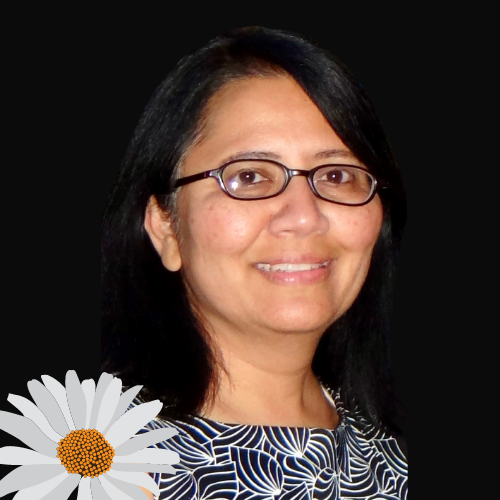 For accelerators the tricky thing is not just connecting different types of data, says Sopact co-founder, Hetal Sheth: it’s also getting hold of it in the first place.
For accelerators the tricky thing is not just connecting different types of data, says Sopact co-founder, Hetal Sheth: it’s also getting hold of it in the first place.
“Once a programme is over, you won’t get data very easily from participants. Funders see this challenge all the time,” she says. Requiring busy entrepreneurs to contribute to another organisation’s reporting burdens them unnecessarily, she argues; the numbers they provide are “often fuzzy and unverifiable” anyway. By linking Miller Center with each enterprise’s dashboard for at least three years post-programme, Sopact hopes to solve that problem.
Second-hand customers
For Sopact, there’s also a bigger issue: data and technology knowhow is crucial, yet remains relatively poor in the social sector – partly because organisations are treated as “second-hand” customers, with companies providing free, lower-spec versions of their software to charities, for example. “Every non-profit has Salesforce’s free system. But it’s very hard to use,” says Hetal.
Unmesh says this general lack of know-how puts social enterprises at a disadvantage, unable to compete with for-profit companies that harness and sell data, for example. But it can also directly affect the success of any business model,
We need to see more funders and investors willing to reward investees for being data-driven
Sopact hopes social entrepreneurs can avoid this disconnect with their customers by equipping them with the skills and tools for simple yet effective data analysis. This should also propel them onto the next stage of growth.
“With Miller Center, we’ve made them investment-ready,” says Unmesh. “Now investors need to step in.” Not just by bringing the cash, he adds: they also need to encourage professional, robust data expertise among their investees, for example by providing financial incentives when the data clearly demonstrate strong impact performance.
“We need to see more funders and investors willing to reward investees for being data-driven, instead of asking for stale data that gives only a one-time picture.”
This article was produced in partnership with Sopact. Sopact is launching its updated Impact Cloud platform – join the launch webinar on 3 May 2022 to learn how to quickly create your own impact data dashboard. Eligible social enterprises can claim a 50% discount for the first year.



